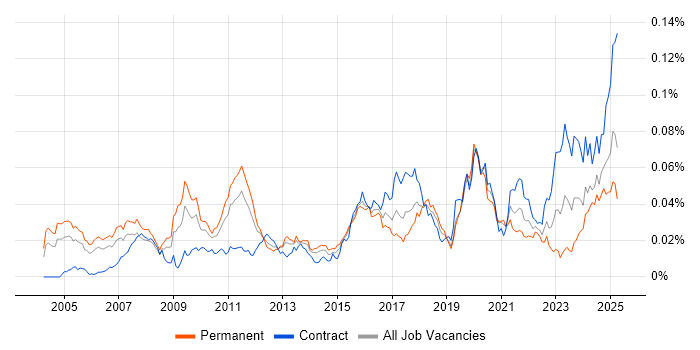Quantitative Finance (Mathematical Finance)
UK > England
The table below provides summary statistics and salary benchmarking for jobs advertised in England requiring Quantitative Finance skills. It covers permanent job vacancies from the 6 months leading up to 31 December 2025, with comparisons to the same periods in the previous two years.
| 6 months to 31 Dec 2025 |
Same period 2024 | Same period 2023 | |
|---|---|---|---|
| Rank | 598 | 653 | 650 |
| Rank change year-on-year | +55 | -3 | +333 |
| Permanent jobs citing Quantitative Finance | 14 | 27 | 10 |
| As % of all permanent jobs in England | 0.027% | 0.054% | 0.022% |
| As % of the Processes & Methodologies category | 0.033% | 0.060% | 0.024% |
| Number of salaries quoted | 4 | 16 | 4 |
| 10th Percentile | £77,250 | £61,875 | £98,625 |
| 25th Percentile | £91,875 | £73,750 | £100,313 |
| Median annual salary (50th Percentile) | £130,000 | £90,000 | £106,250 |
| Median % change year-on-year | +44.44% | -15.29% | -3.41% |
| 75th Percentile | £179,063 | £150,000 | £121,563 |
| 90th Percentile | £195,375 | £202,500 | £135,625 |
| UK median annual salary | £82,500 | £90,000 | £106,250 |
| % change year-on-year | -8.33% | -15.29% | -3.41% |
All Process & Methodology Skills
England
Quantitative Finance falls under the Processes and Methodologies category. For comparison with the information above, the following table provides summary statistics for all permanent job vacancies requiring process or methodology skills in England.
| Permanent vacancies with a requirement for process or methodology skills | 42,784 | 44,895 | 41,229 |
| As % of all permanent jobs advertised in England | 82.28% | 90.18% | 91.26% |
| Number of salaries quoted | 25,500 | 22,481 | 31,965 |
| 10th Percentile | £28,500 | £35,000 | £32,500 |
| 25th Percentile | £37,500 | £45,000 | £43,750 |
| Median annual salary (50th Percentile) | £55,000 | £60,000 | £60,000 |
| Median % change year-on-year | -8.33% | - | -4.00% |
| 75th Percentile | £76,000 | £81,250 | £80,000 |
| 90th Percentile | £96,250 | £100,000 | £100,000 |
| UK median annual salary | £55,000 | £60,000 | £60,000 |
| % change year-on-year | -8.33% | - | -4.00% |
Quantitative Finance
Job Vacancy Trend in England
Historical trend showing the proportion of permanent IT job postings citing Quantitative Finance relative to all permanent IT jobs advertised in England.

Quantitative Finance
Salary Trend in England
Salary distribution trend for jobs in England citing Quantitative Finance.

Quantitative Finance
Salary Histogram in England
Salary distribution for jobs citing Quantitative Finance in England over the 6 months to 31 December 2025.
Quantitative Finance
Job Locations in England
The table below looks at the demand and provides a guide to the median salaries quoted in IT jobs citing Quantitative Finance within the England region over the 6 months to 31 December 2025. The 'Rank Change' column provides an indication of the change in demand within each location based on the same 6 month period last year.
| Location | Rank Change on Same Period Last Year |
Matching Permanent IT Job Ads |
Median Salary Past 6 Months |
Median Salary % Change on Same Period Last Year |
Live Jobs |
|---|---|---|---|---|---|
| London | +54 | 14 | £130,000 | - | 36 |
| Quantitative Finance UK |
|||||
Quantitative Finance
Co-Occurring Skills & Capabilities in England by Category
The following tables expand on the one above by listing co-occurrences grouped by category. They cover the same employment type, locality and period, with up to 20 co-occurrences shown in each category:
